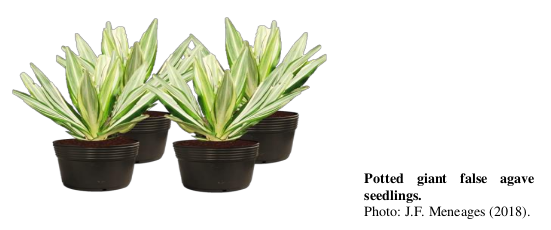Cultivation of Furcraea foetida ([L.] Haw.) under different nitrogen doses and sources

Abstract
The ornamental plant sector is diversified and demanding in terms of quality, which includes plant nutrition. Thus, the objective of this work was to evaluate the leaf development of F. foetida var. Striata cultivated in a greenhouse under different nitrogen dosages and sources. A completely randomized experimental design was used, in a 3×3+1 factorial scheme, nitrogen doses were 100, 200 and 300 mg L-1 and sources with different nitrogen percentages: calcium nitrate, ammonium nitrate and urea, plus the additional treatment (control: no treatment), with six replications. The number of leaves, length, width and leaf area were evaluated. It was observed that there was full leaf development of plants grown in pots, at 390 days after transplanting, the plants had average parameters of 10.4 leaves/plant, 36.9 cm in leaf length and 6.3 cm leaf width. It was concluded that the different nitrogen doses and sources favored the quality of leaf development of F. foetida, preserving their ornamental characteristics in terms of shape and plasticity.
Keywords
Ornamental plants, Succulents, Fertilization, Leaf area, Development
References
- Alvares, C.A., J.L. Stape, P.C. Sentelhas, J.L.M. Gonçalves, and G. Sparovek. 2013. Koppen’s climate classification map for Brazil. Meteorol. Z. 22(1), 711-728. Doi: https://doi.org/10.1127/0941-2948/2013/0507
- Camargo, M.S., S.C. Mello, and Q.A.C. Carmello. 2008. Adubação nitrogenada e potássica do Aster ericoides cultivado em ambiente protegido. Hortic. Bras. 26(2), 190-193. Doi: https://doi.org/10.1590/S0102-05362008000200012
- Epstein, E. and Bloom, A.J. 2006. Nutrição mineral de plantas: princípios e perspectivas. 2Nd ed. Editora Planta, Londrina, Brasil.
- Fagundes, J.D., G. Santiago, A.M. Mello, R.A. Bellé, and N.A. Streck. 2007. Crescimento, desenvolvimento e retardamento da senescência foliar em girassol de vaso (Helianthus annuus L.): fontes e doses de nitrogênio. Cienc. Rural 37(4), 987-993. Doi: https://doi.org/10.1590/S0103-84782007000400011
- Ferreira, D.F. 2014. Sisvar: A guide for its Bootstrap procedures in multiple comparisons. Cienc. Agrotec. 38(2), 109-112. Doi: https://doi.org/10.1590/S1413-70542014000200001
- Floss, E.L. 2004. Fisiologia das plantas cultivadas: o estudo que está por trás do que se vê. 2nded. UPF, Passo Fundo, Brazil.
- Freitas, R.M.O., F.A. Oliveira, M.K.T. Oliveira, J.R.S. Pinto, and N.W. Nogueira. 2010. Desenvolvimento inicial de antúrio submetido a diferentes relações nitrato/amônio. Rev. Verde 5(2), 131-136.
- INRA, Institut National de la Recherche Agronomique. 1970. Techiques d’etude des facteurs physiques de la biosphère. Paris.
- Junqueira, A.H. and M.S. Peetz. 2017 Intellectual property rights in Brazilian floriculture: innovations for the growth and development of the market. Ornam. Hortic. 23(3), 296-306. Doi: https://doi.org/10.14295/oh.v23i3.1071
- Lopes, R.C. 2017. Flora do Rio de Janeiro: Asparagaceae. Rodriguésia, 68(1), 29-32. Doi: https://doi.org/10.1590/2175-7860201768104
- Lorenzi, H. 2013. Plantas para jardim no Brasil. Herbáceas, arbustivas e trepadeiras. 3th ed. Intituto Plantarum, Nova Odessa, Brazil.
- Lorenzi, H. and H.M. Souza. 1999. Plantas ornamentais no Brasil. Herbáceas, arbustivas e trepadeiras. 2nd ed. Instituto Plantarum, Nova Odessa.
- Mainardi, J.C.C.T., R.A. Bellé, and L. Mainardi. 2004. Produção de crisântemo (Dendranthema grandiflora Tzvelev.) ‘Snowdon’ em vaso II: ciclo da cultivar, comprimento, largura e área da folha. Cienc. Rural 34(6), 1709-1714. Doi: https://doi.org/10.1590/S0103-84782004000600007
- Menegaes, J.F., R.A. Bellé, F.A.A.L. Backes, A.P. Zago, and F.L. Franzen. 2016. Qualidade das hastes florais de crisântemo cv. Snowdon cultivado em diferentes períodos de dias longos. Acta Iguazu 5(4), 54-62.
- Menegaes. J.F., C.F. Ferreira, and R. Moccellin. 2022. Plantas ornamentais: conceitos básicos de cultivo. Pantanal, Nova Xavantina, Brazil. Doi:https://doi.org/10.46420/9786581460549
- Moraes, L., R.K. Santos, T.W. Zeizer, and R.A. Krupek. 2013. Avaliação da área foliar a partir de medidas lineares simples de cinco espécies vegetais sob diferentes condições de luminosidade. Rev. Bras. Biocienc. 11(4), 381-387.
- Mota, M.R., L. Sangoi, E.D. Schenatto, W. Giordani, C.M. Boniatti, and L.R. Dall’Igna. 2015. Fontes estabilizadas de nitrogênio como alternativa para aumentar o rendimento de grãos e a eficiência de uso do nitrogênio pelo milho. Rev. Bras. Ciênc. Solo 39(2), 512-522. Doi: https://doi.org/10.1590/01000683rbcs20140308
- Murillo-Serna, J.S., E.J. Rincón-Barón, and F. Alzate-Guarin. 2018. Anatomía foliar comparativa de tres especies de Furcraea (Asparagaceae: Agavoideae). Hoehnea 45(4), 607-615. Doi: https://doi.org/10.1590/2236-8906-06/2018
- Prado, R.M. 2020. Nutrição de plantas. 2nd ed. UNESP, São Paulo, Brazil.
- Santos, F.H.S., E.F.A. Almeida, J.E.M. Frazão, S.N. Reis, and Â.M.P. Nascimento. 2015. Adubação nitrogenada via substrato no cultivo de bromélia. Ornam. Hortic.21(2), 185-192. Doi: https://doi.org/10.14295/aohl.v21i2.587
- Taiz, L. and E. Zeiger. 2013. Fisiologia vegetal 5th ed. Artemed, Porto Alegre, Brazil.
